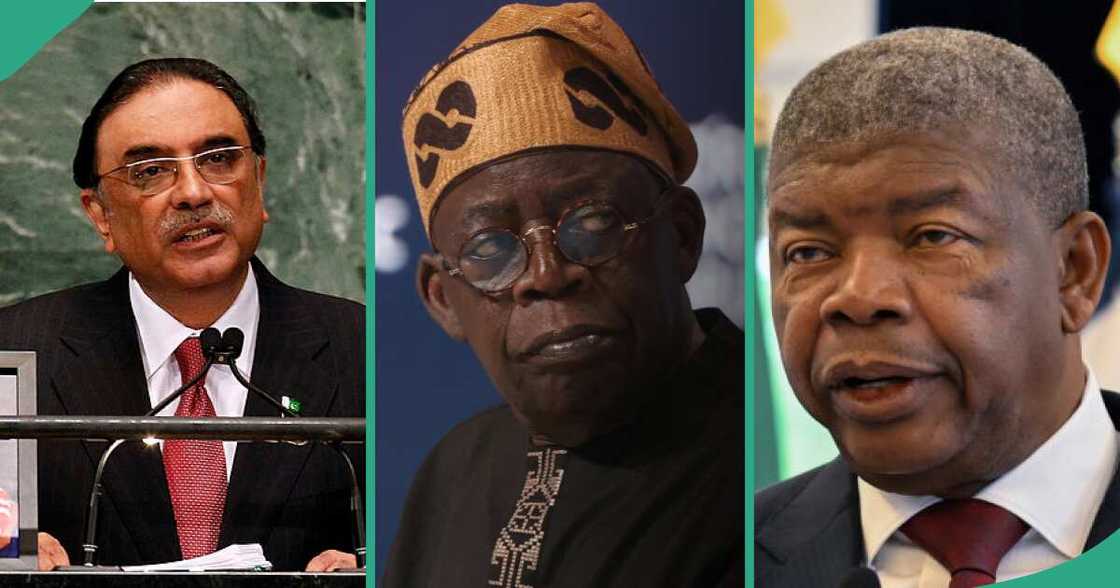Nigeria Ranks High as World Bank Releases List of Top 10 Countries Indebted to China
- Nigeria, Egypt, Angola, Ethiopia, and Zambia are among the top countries with massive debt to China
- The country with the largest debt profile with China is Pakistan, with a total debt stock of $26.60 billion
- Nigeria’s debt to China is about $5 billion and has been used primarily to build roads, railways and power plants
PAY ATTENTION: Legit.ng Entertainment Awards 2024 Voting Is Alive. Choose the best entertainer in 15 categories for FREE.
Legit.ng’s Pascal Oparada has reported on tech, energy, stocks, investment, and the economy for over a decade.
In the last decade, external debt for low and middle-income countries has spiked, and economic growth has outgrown this, thus raising serious concerns.
The trend is seen in severely poor countries where debt stocks have increased.

Source: Getty Images
Total global debt to China hits $9 trillion
Many low-income countries eligible for the World Bank’s International Development Association (IDA) resources face increased debt vulnerabilities, with over 60% at high risk of debt distress as of 2023.
A report on the World Bank’s International Debt shows that while external debt for low and middle-income countries decreased marginally by 2.24% from $9.3 trillion in 2021 to $9 trillion in 2023, it rose by 2.7% for IDA-eligible countries to hit a record $1.1 trillion.
Data from the World Bank shows how much each country owes to China. External debt stocks represent the total debt a country owes to foreign creditors.
The World Bank lists the top 10 countries in debt to China as of 2022.
Pakistan: $26.60 Billion
The country is the most indebted to China, with a debt of $26.60 billion, mainly due to the China-Pakistan Economic Corridor, a flagship project of China’s Belt and Road Initiative (BRI).
While the infrastructure development under the project, including roads, railways, and energy projects, promises long-term economic benefits, the debt poses repayment challenges.
Angola: $20.98 Billion
The African country’s debt to China is estimated at $20.98 billion, accumulated via loans for rebuilding infrastructure after its civil war.
China has invested heavily in Angola’s oil sector, swapping loans for oil shipments.
While the investments have helped rebuild the country, they have also created a dependency on Chinese finance and increased vulnerability to oil price fluctuations.
Sri Lanka: $8.84 Billion
Sri Lanka’s debt to the Asian country has remained a subject of international scrutiny following the 99-year lease of the Hambantota Port to a Chinese firm after Sri Lanka defaulted on its loans.
The scenario has raised concerns about the potential debt trap diplomacy, where excessive borrowing from China could lead to the loss of sovereign assets. Sri Lanka’s economic prospects remain precarious, with ongoing challenges to balance development needs with debt repayment.
Ethiopia: $6.82 Billion
The East African country’s debt to China is $6.82 billion and has been used to develop infrastructure, including the Addis Ababa-Djibouti Railway and various industrial parks.
Experts believe Ethiopia’s political instability and the Tigray conflict escalate the risks associated with high debt levels, potentially hampering its economic progress and ability to meet repayment terms.
Kenya: $6.69 Billion
The country is indebted to China for $6.69 billion, which was used for infrastructural projects such as the Standard Gauge Railway.
The project was intended to boost connectivity and trade within East Africa, but it has been a contentious issue due to its high costs and doubtful economic viability. The project has also generated fears of increased taxation and austerity measures as the government struggles to meet repayment schedules.
Zambia: $6.08 Billion
The country’s Chinese debt has increased its dependence on Chinese financing for mining and infrastructure projects.
It has seen significant Chinese investment in its mining sector, leading to economic difficulties and a high debt burden, inflation, and currency devaluation.
Bangladesh: $6.05 Billion
The country’s debt to China has financed infrastructure projects such as power plants and bridges. While these developments are essential for its economic growth and development, the debt level raises questions about fiscal sustainability.
Laos: $5.25 Billion
This tiny country has borrowed $5.25 billion from China, mainly from building the Laos-China Railway. The project aims to transform Laos into a land-linked country to boost trade and connectivity.
Egypt: $5.21 Billion
The North African country’s debt has been used for infrastructure such as the New Administrative Capital. These projects are part of Egypt’s more extensive strategy to modernize its infrastructure and attract foreign investment.
Nigeria: $5.29 Billion
The West African country’s debt is used mainly for infrastructure projects such as railways, highways, and power plants.
Nigeria's external debt recently rose to over $43 billion, with Chinese loans accounting for the most, bringing its total debt stock, domestic and external debts to over $100 billion.
Take Nigeria’s public debt surges to N97.34 trillion
Legit.ng earlier reported that data from the Debt Management Office (DMO) has revealed that Nigeria’s public debt has hit about N97.34 trillion as of Q4 2023.
DMO stated this in a statement on Friday, March 22, 2024.
The DMO said Nigeria’s public debt, as of December 31, 2023, stood at 97.34 trillion or $108.22 billion.
Proofread by Kola Muhammed, journalist and copyeditor at Legit.ng
PAY ATTENTION: Unlock the best of Legit.ng on Pinterest! Subscribe now and get your daily inspiration!
Source: Legit.ng






